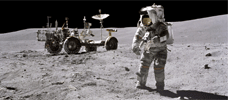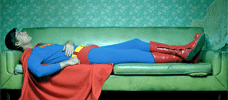Reviews
David Sington
UK / USA, 2007
Credits
Review by Jason W
Posted on 24 September 2007
Source 35mm print
Categories The 27th Atlantic Film Festival
In the Shadow of the Moon is the story of the only twenty-six men to ever be a part of the two hundred and forty thousand mile-high club. Ecstasy for the Apollo astronauts was the moon itself, and from 1969 to 1972 she was a fickle goddess, unattainable to some, a lasting mystery to all, and an instant hero-creator out of anyone who walked on her surface. The unspoken premise of this film is that the surviving Apollo astronauts are not going to be around forever, and so it is important to record their faces and their voices for posterity, and to collect their specific memories of space travel into more or less a chronological tapestry of recollection. The stories in this film have no doubt been recycled from the public speaking banquet circuit of the past thirty-five years, and while at times In the Shadow of the Moon feels like a slick techies’ roast with Apollo 11’s humorous Mike Collins as the unofficial MC, in gathering for the first time in one place an oral history of what it took to put humankind on the moon, the film is given a weighty historical significance.
The aging faces of the astronauts stare straight at the viewer in extreme close-up as they speak, heads giant as la lune itself. Errol Morris’ Interrotron is presumably in use here, and as the astronauts talk the viewer through the tasks and routines of what it took to get from the earth to the moon and back again, footage of the astronauts doing their job and audio clips of interactions between mission control and space are interspersed with the storytelling. It’s the fog of chores, and we are reminded that what seems impossible to most was employment to these men, even as employment meant facing the real possibility of death throughout the entirety of their missions.
The moon’s shadow is not a metaphor for these astronauts’ subconscious, and the film is not an opportunity to share dirty little secrets they have been dying to spill for years. Even if the astronauts wanted to open up about the traumas and gossip of being members of an exclusive club of aging scientist rock stars, they could not, as the public relations campaign which has been intact from before these men even set foot on the moon simply would not allow it. The result is a film which amounts to little more than a nature documentary about humans, in which the viewer is informed about superficial aspects of astronauts’ lives and work through pleasant anecdotes and harmless bits of trivia. I actually found it soothing to watch American national treasures who know they are treasures enjoy their notoriety in the winter of their lives, but this film is obviously gentle propaganda and an example of living legends confirming their own mythos. Four decades past Neil Armstrong first stepping on the moon, I wonder if those closest to the event can even tell collective mythology apart from individual recollection anymore.
The most obvious absentee is Armstrong himself, which amounts to Mick Jagger declining to be interviewed for a definitive Rolling Stones documentary. There being no mention or rebuttal of the growing community who believes the moon landings to be a hoax makes for an additionally glaring omission. Combined with these omissions, the poorly contextualized placing of the Apollo program within 1960s culture makes it seem as if this film’s goal is only to appear thorough, while disregarding realities which threaten to complicate history.
It is not the astronauts’ job to interrogate the NASA space program’s place in the civil right movement, but it is the filmmakers’ duty to do so, especially when an underlying truism of this entire documentary is that to land on the moon in ‘68 you had to be male and white. Several astronauts acknowledge the strangeness of being isolated from their generation’s movement towards a more open society, as well as the guilt of having pilot friends who were fighting and dying in Vietnam, which could well have been them. Civil strife is otherwise glossed over and summarized in a clichéd montage of familiar images and sounds of the era, with the glaring disparity of what it symbolically meant for white males to be landing on the moon even as blacks and women were fighting for basic equality rights never acknowledged.
The final ten minutes of the film unfortunately brings up a few of the astronauts’ religious beliefs. It quickly becomes apparent that the subjective uniqueness of having traveled to the moon and everything which makes that uniqueness appealing when shared with others, does not translate to sharing one’s unique relationship with God. An extended mention of the importance of protecting the environment also crassly takes the film into unnecessary territory, making the astronauts seem like trendy enviro-shills. I half expected Al Gore to pop into frame and claim to be one of the only twelve men to have ever stepped on the lunar surface. Thankfully, he does not.
In 2007, it is difficult to find storytellers with tales of a distant place only they have been to, and whom nobody has returned to since, but here they are. This film is enjoyable, even riveting at times, but too much of the story is left in the shadow of the moon, probably forever.
More The 27th Atlantic Film Festival
-

In the Shadow of the Moon
2007 -

Puffball
2007 -

Lust, Caution
2007 -

Confessions of a Superhero
2007 -

Chasing Ghosts: Beyond the Arcade
2007
We don’t do comments anymore, but you may contact us here or find us on Twitter or Facebook.



